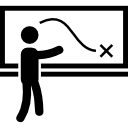March 30 2016 Lesson Notes: Difference between revisions
No edit summary |
|||
| Line 6: | Line 6: | ||
== Objectives == | == Objectives == | ||
What are we going to learn today? | ''What are we going to learn today?'' | ||
* You will review [[conditionals]] and [[abstraction]]. You will do this through the [[date fashion]] problem set. | * You will review [[conditionals]] and [[abstraction]]. You will do this through the [[date fashion]] problem set. | ||
| Line 12: | Line 12: | ||
== Explore == | == Explore == | ||
Describe what kinds of hands-on/minds-on activities students will be doing? | ''Describe what kinds of hands-on/minds-on activities students will be doing?'' | ||
| Line 18: | Line 18: | ||
== Explain == | == Explain == | ||
List higher order thinking questions which teachers will use to solicit student explanations and help them to justify their explanations. | ''List higher order thinking questions which teachers will use to solicit student explanations and help them to justify their explanations.'' | ||
== Extend== | == Extend== | ||
Describe how students will develop a more sophisticated understanding of the concept. | ''Describe how students will develop a more sophisticated understanding of the concept.'' | ||
== Evaluate == | == Evaluate == | ||
How will students demonstrate that they have achieved the lesson objective? | ''How will students demonstrate that they have achieved the lesson objective?'' | ||
* students will receive a formative assessment for their problem set work. [[Media:Problem-setrubric.pdf|Please click here to see how you will be graded]] | * students will receive a formative assessment for their problem set work. [[Media:Problem-setrubric.pdf|Please click here to see how you will be graded]] | ||
| Line 37: | Line 35: | ||
== As a computer scientist, you have == | == As a computer scientist, you have == | ||
''These are the characteristics every computer scientist works towards.'' | |||
* Confidence in dealing with complexity | * Confidence in dealing with complexity | ||
Revision as of 12:39, 1 April 2016

Class lesson notes[1]
These are the lesson notes for a class meeting. You will find links, homework, and other information about our class meeting here. If you missed a class, or you want to review what we did in a class, this is the right page for you!
Date[edit]
March 30 2016
Objectives[edit]
What are we going to learn today?
- You will review conditionals and abstraction. You will do this through the date fashion problem set.
- You will review your project on our design project. All of you will work on your design project.
Explore[edit]
Describe what kinds of hands-on/minds-on activities students will be doing?
Explain[edit]
List higher order thinking questions which teachers will use to solicit student explanations and help them to justify their explanations.
Extend[edit]
Describe how students will develop a more sophisticated understanding of the concept.
Evaluate[edit]
How will students demonstrate that they have achieved the lesson objective?
- students will receive a formative assessment for their problem set work. Please click here to see how you will be graded
Homework[edit]
- We must work on our design project. Everyone is required to respond to Mr. MacKenty's feedback on the discussion page for your project.
As a computer scientist, you have[edit]
These are the characteristics every computer scientist works towards.
- Confidence in dealing with complexity
- Persistence in working with difficult problems
- Tolerance for ambiguity
- The ability to deal with open-ended problems
- The ability to communicate and work with others to achieve a common goal or solution
Standards[edit]
- Apply analysis, design, and implementation techniques to solve problems (e.g., use one or more software lifecycle models).
- Describe a software development process used to solve software problems (e.g., design, coding, testing, verification).
- Use collaborative tools to communicate with project team members (e.g., discussion threads, wikis, blogs, version control, etc.).